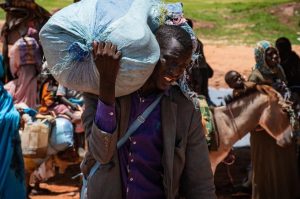Famine declared among refugees in Sudan
 Famine has been officially declared in Sudan’s North Darfur region, a region that is hosting refugees.
Famine has been officially declared in Sudan’s North Darfur region, a region that is hosting refugees.
The food shortages are worst in a camp for displaced people, which is currently home to hundreds of thousands of people.
It follows more than 15 months of war in the country.
“More than ten million people have been displaced by the war and now Sudan is facing a deepening hunger crisis,” a UNHCR spokesperson said.
“A declaration of famine is very rare and is only confirmed following many deaths, so this development is extremely alarming. We call on any Australians who can to donate,” the statement said.
Sudan has become the largest internal displacement crisis in the world with almost eight million people displaced across the country.
The conflict in Sudan erupted in mid-April between the Rapid Support Forces (RSF) and the Sudanese Armed Force (SAF) which previously had a power-sharing arrangement.
The conflict has caused a severe humanitarian crisis as shortages of food, water, medicines, and fuel have become extremely acute.
Prices of essential goods have dramatically increased due to disrupted trade routes and limited access, making them unaffordable for those remaining in besieged towns and cities across Sudan.
Widespread human rights violations have been reported, including gender-based violence, forced displacement, and killings of civilians.
In January, the United Nations Security Council has expressed grave concern over the escalating violence in Sudan and the deteriorating humanitarian situation.
In a statement, the council condemned the reported attacks against civilians and the expansion of fighting into areas with large populations of internally displaced persons, refugees, and asylum seekers.
The Council emphasised the ongoing violations of international humanitarian law and human rights abuses, including cases of sexual violence in conflict.
It urged all parties involved in the conflict to exercise restraint and protect civilians and civilian infrastructure in accordance with their obligations under international law, particularly international humanitarian law.
UNHCR is on the ground in Sudan and neighbouring countries helping people who’ve been displaced by the conflict.
Since the start of the war, UNHCR has reached some 800,000 displaced Sudanese with aid, including cash assistance so they can buy food.
But resource constraints and lack of access are hampering humanitarian relief efforts.
After weeks of waiting at a border crossing in eastern Chad, UNHCR recently managed to get three trucks of supplies for 1,000 families into North Darfur, a tiny percentage of what is needed.
The UN High Commissioner for Refugees, Filippo Grandi, has called on the warring parties to immediately facilitate humanitarian access to communities that require life-saving aid.
“The level of suffering is truly unconscionable,” Mr Grandi said.
“It’s time for those fighting each other to start caring for their own people and for states with influence to make serious efforts to bring them to the negotiating table, he said.”
People can donate to help the victims of the famine here: https://www.unrefugees.org.au/campaigns/sudan-emergency












